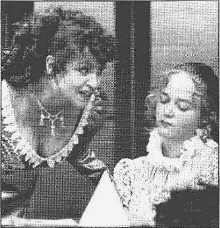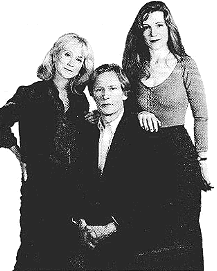Arcadia - Tom Stoppard
Drama gets sums right
Arcadia - Library Theatre
Who'd have thought a play heavy on mathematical theory would
add up to a brilliant night out?
But lighten the algebra,thermodynamics and
iterated
algorithms (yes really) with a witty,pacy
comedy of morals and manners,romance and rivalry and the Library Theatre's
got a real winner in Tom Stoppard's Arcadia. |
 |
| Mathematical Problem: Jane Maud (left) as Lady Croom
and Isabel Pollen as Thomasina Coverly |
|
The play's split between 1809 and 1999.
In the historic part,tutor Septimus Hodge teaches
maths to Thomasina,the ultrabright daughter of the house
while carrying on romantic intrigues with both her mother and
her house guest.
But when he's found out,the cuckolded husband - a
failed poet - challenges him to a duel.
Fast forward to the 90s in the same country house and academics Hannah
Jarvis and Bernard Nightingale are tracking back to 1809 to
research the home's mysterious hermit and its links to
romantic poet Lord Byron respectively.
It might sound complicated,but on the whole,is so cleverly written and
well acted that nearly three hours just breeze by.
It's light and witty,but bursting with historical brainpower - just like
you'd expect from the writer of Shakespeare in Love.
Arcadia is at the Library until November the 20th.
The box office is on 0161 236 7110. |

Stoppard's stars : Felicity Kendall,Bill Nighy,Harriet
Walter |
Felicity Kendall's professional relationship with playwright Tom Stoppard
underwent a spectacular revival last year,with the opening of his latest
play "Arcadia" at London's National Theatre.
Skipping across the centuries and juggling complex ideas
(Newtonian Physics and Chaos
Theory) with Stoppard's typical brio,"Arcadia" was first on BBC radio
over Christmas and is broadcast again this week (Sunday Radio3).
Alongside Kendall - who can currently be seen in "Honey for Tea" (Sunday
BBC1),Arcadia features Bill Nighy and Harriet Walter reunited after their
memorable pairing in "The Men's Room",and Sam West,son of Timothy. |
Front 4
A mechanical science lesson

Paul Goodwin as Antoine Lavoisier and Lucy Davenport as Mme
Lavoisier in 'Oxygen'
OXYGEN RIVERSIDE STUDIOS LONDON
Plays about science are proliferating, with Michael Frayn, Tom Stoppard and
Stephen Poliakoff heading the pack of dramatists prepared to find inspiration
outside the comfort zone of the humanities. It's not every day though, you
get the chance to review a theatre piece co-authored by a Nobel chemistry
laureate and the man who invented the Pill.
This, though, is now the case with Oxygen, a collaboration between
Roald Hoffman (who is also professor of humane letters at Cornell) and Carl
Djerassi (who, in addition to synthesising the first oral contraceptive,
and winning medals for novel approaches to insect control,is a published
poet).
This year marks the centenary of the Nobel Prize. Receiving its English premiere
now in Andy Jordan's strongly cast but slightly cramped production, the play
kicks off from the idea that, to mark this occasion, the committee has decided
to award "retro-Nobels" for great discoveries made before the inception of
the prizes. In chemistry; the first of these is to go to the discoverer of
oxygen. But should this post- dated laureateship go to the Swedish apothecary,
Carl Wilhelm Scheele, or to English unitarian minister Joseph Priestley (who
erected a false theory on his findings), or to the French chemist and tax
collector, Antoine Lavoisier?
Which is the same as to ask: what constitutes "being first" - the initial
physical discovery; pipping everyone else to the publishing post; or having
the deepest understanding of the scientific implications? In a manner patented
by Stoppard's Arcadia and Shelagh Stephenson's An Experiment with
an Air Pump, the play shifts between present and past: here, between
the deliberations of the committee and an imaginary meeting of the three
protagonists in Stockholm in 1777, where they are shown vying for the King's
Gold Medal.
The structure is ambitious, even incorporating the performance of a verse
masque on "The Victory of Vital Air Over Phlogiston". The temporal oscillations
and the doubling of the actors (with Paul Goodwin an especially convincing
intellectual as Lavoisier/Hjalmarsson) allow the piece to demonstrate that
it's plus ca change amongst scientists - a preoccupation with the
priority continuing to divide the contemporary chemists. But there's a
disappointing thinness of texture to the dispute here over whether the referee
on a scientific journal postponed, with needless provisos, the publication
of a paper while passing on its findings to a group of rival scientists.
Better playwrights have employed this to-and-fro structure for a more profound
questioning of "progress" than one couched in narrowly professional terms,
while, in Stoppard, it has even been used as the means of setting up an
imaginative resistance to science's gloomy entropic predictions. Oxygen
begins piquantly with the spouses of the three 18th- century boffins
chatting in a Swedish sauna. But this is no Merry Wives of Stockholm. Its
aim, rather; is to show how these clever women could
go only so far and no further in participating in their husbands' work.
Through the clunking device of a contemporary PhD graduate who is amanuensis
to the Nobel committee and author of a study of chemists' better halves,
the play uncovers the deeply ambiguous yet, in the circumstances, understandable)
way in which Lucy Davenport's superbly flirtatious and enigmatic Mme Lavoisier
sought to assist her husband. Again, though, better dramatists have deployed
the structure to show how the present is comically inclined to misinterpret
the past. Here, the historical evidence would seem to be tricky but free
from all dubieties. That's one of several indications that the primary impulse
of this honourable and rather mechanical play is pedagogic.
PAUL TAYLOR To l Dec, 020-82371111
File Info: Created 10/9/2001 Updated
27/11/2001 Page Address:
http://www.fortunecity.com/emachines/e11/86/stoppard.html


